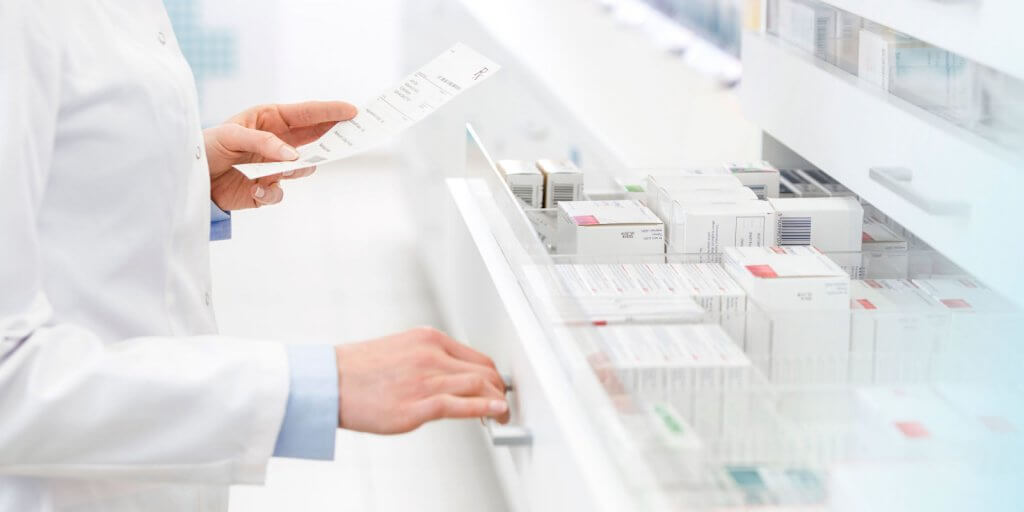A Pharmacist – What Does This Profession Include?
In fact, this profession is rather versatile. Besides ordinary and online drugstores, pharmacists work at clinics, hospitals, drug companies; today there are also personal pharmacists, pharmacy consultants, etc.
 The hospital pharmacist works in a hospital team; he prepares and dispenses medications to patients treated in this hospital. The community pharmacist prepares and dispenses medicines on prescription to the public, as well as non-prescription medications. Health practitioners and doctors address pharmacists for consultations on selection of drugs, their dosages, and interactions. Some pharmacists go through specialty training and specialize in the treatment of certain diseases, like, for example, diabetes.
The hospital pharmacist works in a hospital team; he prepares and dispenses medications to patients treated in this hospital. The community pharmacist prepares and dispenses medicines on prescription to the public, as well as non-prescription medications. Health practitioners and doctors address pharmacists for consultations on selection of drugs, their dosages, and interactions. Some pharmacists go through specialty training and specialize in the treatment of certain diseases, like, for example, diabetes.
In a company a pharmacist may specialize in marketing/sales of particular medications, or in pharmaceutical research. Pharmacists taking part in the researches or working with investigatory agencies or pharmaceutical companies, as well as running independent laboratories, may participate in developing and testing new drugs, studying developed drugs for possible interactions and safety. Poison Control Pharmacists in an emergency’s Poison Control Center (http://www.capcc.ca) tell what to do in emergency situations (chemical poisoning, negative drug interaction, overdose). There are also veterinary pharmacists specializing on medications for pets, because animals often need other medications than people, in other forms, with other flavors, in other doses.
A retail pharmacist is a most wide spread profession. He or she sells you medications in a pharmacy and has a number of things to do:
- Properly interpret a person’s prescription. Doctors often have an awful handwriting that is not easy to understand, but it’s very important to give the buyer the medication he is prescribed and not something else.
- Advise a patient a medicine to solve his/her health problem (when a prescription is not needed), like aches/pains, colds or coughs. In some cases the pharmacist has to explain the person how to properly take the medication. When it is necessary, a pharmacist may give information on drug interactions, side effects.
- Preparing drugs may be also a pharmacist’s task, but today it is not always necessary: in many independent retail pharmacies these routine activities such as pill counting and billing are delegated to certified pharmacy technicians, while pharmacists can devote more time to patients.
Anyway, a pharmacist is still not a doctor, and you should not rely on them too much if you have a serious problem. Pharmacists cannot make diagnoses and appoint treatment. Also keep in mind that some drugstores hire people without special education or students who are not qualified enough. And some drugstores require that pharmacists sell the more expensive versions of medications, because it is business. So it is good to trust pharmacists but it will be even better if you find out about the medications before you go to the drugstore.
Top Skills a Pharmacist Has to Have
Like any other profession, this one requires a range of talents and skills for success:
- Attention to detail. Making errors is not good in this profession, because if a patient receives a wrong drug or a wrong dosage, this may have negative consequences for his health. An accurate inventory is also important in retail pharmacies and hospitals.
- Good memory. Pharmacists have to remember information about hundreds of medicines – their brand and generic names, their effects, side effects, contraindications, and possible interactions with other drugs. New kinds of drugs appear on the market all the time, and pharmacists have to keep up with these news. To prove their qualification and knowledge, they have to regularly renew their license.
- Good skills in math and science. Pharmacists have to use knowledge from chemistry/biochemistry, biology and statistics every day, so they should have strong backgrounds in these sciences. This is necessary for being able to study patients’ profiles and calculate doses.
- Computer literacy. More and more retail pharmacies connect to the Internet, and computerization in the industry is growing fast. In the nearest future the electronic prescriptions are likely to replace the ones written in doctors’ illegible hand.
- Communicating with people. Hospital pharmacists have to deal with patients, retail pharmacists – with customers; both have to consult with doctors. Communication is also entailed when a pharmacist is a study coordinator or has to oversee technicians’ work.
How to Become a Pharmacist
The pharmacology students usually study math, chemistry and biology, physics, human anatomy and histology, pharmacology, medical ethics; their classes may also include economy, history, sociology, English and Latin languages, etc. To achieve a pharmacist’s qualification in different countries you will need to meet different requirements.
 For example, in Great Britain it is necessary to have a 4-year Master of Pharmacy degree from a UK school of pharmacy, an A-level chemistry and A-/AS-levels biology/mathematics/etc., "preregistration training" (practical training in a pharmacy - 1 year), passing an examination after preregistration training to register with the Royal Pharmaceutical Society.
For example, in Great Britain it is necessary to have a 4-year Master of Pharmacy degree from a UK school of pharmacy, an A-level chemistry and A-/AS-levels biology/mathematics/etc., "preregistration training" (practical training in a pharmacy - 1 year), passing an examination after preregistration training to register with the Royal Pharmaceutical Society.
To legally work as a pharmacist in the USA, a person must get a Doctor of Pharmacy degree from a school accredited/approved by the Accreditation Council for Pharmacy Education and pass 2 licensure exams. PharmD programs last for 4-6 academic years (the term is longer when pre-professional education is added to professional education. PharmD programs include internships - experiential coursework.
To be allowed to legally practice as a pharmacist, it is necessary to get licensed. In the US, for example, individual states issue the licenses. Different requirements are set by each jurisdiction's board of pharmacy – the list of such state boards can be found at the special NABP website.
Besides professional educational, you can better prepare for getting future job by getting necessary skills: computer proficiency, communications skills, etc. Think beforehand where you would like to work (hospital, pharmaceutical company, drugstore, health care agency) and get prepared for that specific job. Check such job openings in your area.
Take into account that pharmacists have to spend much of their working days on feet, and those working in hospitals sometimes have to work odd hours. They also need to have no problem in communication with many people.
- Pharmacists are always in demand, and are able to find jobs even in crisis, because people always need medications. And by the way, pharmacists are among the highest paid professionals in the developed countries’ healthcare industry.
- Today pharmacists can earn money from home working in an online drugstore.
- Pharmacists have knowledge and skills that can be very useful for them in different situations. They know what to do and what to take if they suddenly catch a cold, have allergy or food intoxication, or anything else. They are also able to help their relatives and friends, especially if there’s no opportunity to immediately see a doctor in case of some health problem.
- Pharmacists can save money on medications when they go through any treatment, because they know how to replace expensive drugs with its cheaper analogues generics.
- Pharmacists in general know a lot about human body functioning and diseases, which allows them to lead a healthy way of life (if they want to) and prevent various health problems.
5 Actual Advices from a Pharmacist
Many people are used to perceive pharmacists as the sellers in the drugstores, forgetting that in fact they are medical professionals, who can give useful advices concerning specific health conditions and recommend treatment of minor illnesses like colds and coughs, skin problems and eye infections. This allows to get instant help when it is impossible to see the doctor at once.
- If you are in distress for money and need to go through any treatment, there’s a good news: there’s often (though not always) an opportunity to save money on medications. Usually different companies produce the same kind of medication, and their prices may significantly vary. Also there’re generic versions of medications, and they cost cheaper, sometimes much cheaper, at the same time their quality may be as good as that of the branded drugs. The price of generics is lower because the company does not have to spend money on research and advertising.
- Make sure that your body gets enough of vitamins. Try to keep to a healthy diet and eat versatile food. It is strongly recommended to eat fresh fruit and vegetables every day, because refined food loses vitamins. If your diet is still not nutritious enough, buy supplements. A preparation may include one vitamin, a group of vitamins (as B group) or a complex of vitamins. But don’t overdo. It is usually recommended to take vitamins with or after meal.
- If you’ve caught a cold, you should understand that many medications that are advertised at TV or prescribed to you by your therapist just diminish symptoms, but do not heal illness. So pay attention to the instruction. If you want to hasten recovery, ask to prescribe you some immune modulator, or consume natural immune modulators like, for example, garlic, onion, honey, lemons, etc. Drink a lot of pure water. Eat fresh fruit. Take a rest. Use high quality essential oils for inhalations and aroma lamps, if there’re no contraindications for you.
- Keep adsorbents at home. Nobody is protected from food intoxications. One can feel sick after a meal in the restaurant or after buying a bad quality product in the nearest supermarket. If you’ve got poisoned, you should see a doctor, because food intoxication can be dangerous. But if there’s no opportunity to see a doctor soon, take adsorbent to take infection out of the body. You may take activated coal or any modern adsorbent (there’re plenty of them now at different prices). They can also be used to clean an organism from toxins.
- To protect yourself and your family from emergencies and in unpredictable situations – make a first aid kit and keep it at home. It should include preparations one may need in case of a headache, food intoxication, a scratch, a wound or a burn, etc. Teach your children and other family members how to use a first aid kit, put it in a place accessible for everybody (but keep dangerous medications out of reach of children). If you are going on a vacation, hiking, to the picnic or on a long car trip, take your first aid kit with you.

